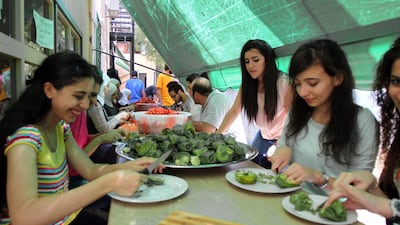At night, families gather for picnics on dusty patches of grass that line sections of motorway running south out of Damascus — a holiday tradition revived this Ramadan in defiance of Syria’s on-going war.
This is the fourth Ramadan since the start of the uprising-turned-conflict in March 2011.
While the violence grinds on, there are small signs — including the revived custom of picnicking next to bustling, polluted roads — that the war is not hindering this year’s Islamic holy month in the capital. At least not to the same extent it once did.
“I was shocked by how many families were sitting on the green areas along the motorway, children, women, men all out there during power cuts, eating fruits and playing and smoking water pipes just as they always used to,” said Abu Zaidoun, a 35-year-old government employee who lives in the southern suburbs.
“It was around midnight and the roads were all busy, the people were out, they were ignoring the war,” he said.
Last year, the same part of Nahar Aisha, on the Damascus-Deraa motorway, had been deserted at night, a landscape marked by buildings riddled with bullet holes and debris from tank shelling.
In the more affluent neighbourhoods of central Damascus, residents have become well practised in the art of turning a blind eye to the war. Some insist it is something happening elsewhere. Others escape it by taking breaks in the safety of neighbouring Lebanon.
Still, in the poorer neighbourhoods around the city centre, the brutal conflict has been impossible to ignore. Years of heavy fighting have seen the death toll in rural Damascus rise to among the highest in the country, in a war that has killed more than 160,000 people.
Air strikes, artillery bombardments and gunfights are not an abstraction in these suburbs and on previous Ramadans, that close brush with violence and financial hardship had dampened the holiday spirit.
This year however, the situation appears to be different.
“This Ramadan I’m so happy, people are going to the markets, to coffee shops, they have been watching the world cup football, all trying to forget the killing and the bloodshed,” said a taxi driver from Ruken El Deen, a working class area on the northern edge of Damascus, built up on the side of Qassiun mountain.
While it has been spared major destruction, unarmed protesters and armed rebels have at different times been present there, placing it on the edge of the front lines in the battle for Damascus.
Forces loyal to president Bashar Al Assad have also scaled back checkpoints in some prominent places in the city since the start of Ramadan, including on a major road linking Bab Masala to upmarket Mezzeh, via Kafr Susa. The area includes major security force offices — likely targets for rebels — and lies close to rebelling southern suburbs such as Yarmouk, Hajar Aswad, Qadam and Daraya.
Two years ago, the road was blocked off entirely during Ramadan. This year, security presence has been cut back significantly.
A major checkpoint that was once reinforced by several tanks and torn up cement in Nahar Aisha has also been removed.
That put an end to hours-long traffic jams that used to build up as soldiers checked the IDs of everyone passing through.
It also bolstered regime claims that the military is gaining a firmer control of Damascus, helping to convince residents that the authorities are no longer afraid of rebels infiltrating central areas.
“Many people have been encouraged by the removal of the checkpoints, and they feel it is safe to leave their houses even late at night. Restaurants and cafes are now more crowded than before in Damascus,” said a city resident, who remained in Damascus throughout the war.
“This Ramadan things are certainly different from the previous years. People have adjusted themselves to living with the crisis and they are trying to enjoy themselves and do not think as much about the on-going fighting in the country,” he said.
Pre-war Ramadans in Damascus were marked by long, late nights, road side picnics, visiting families and friends, and watching Bab Al Hara, a Syrian made soap opera about life in French-occupied Damascus. All of those traditions re-emerged this year, once again acting as way points through the holiday season.
News programmes detailing the war are still widely watched, but not as obsessively as they once were.
“People are tired of the news, both sides, pro-Assad and rebels are tired, if you do go through a checkpoint the soldiers hardly bother to look at your ID. They are exhausted from standing there in the sun all day, and in the rebel areas the fighters are also tired, they just want some rest,” said a taxi driver who works on both sides of the lines.“This year we are not thinking about the war, even though we know it is still happening very close to us. Instead, we are thinking about the TV soap operas and worrying about finding a free table in busy cafes at night. We are trying to live normal lives,” he said.
psands@thenational.ae

